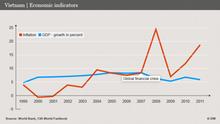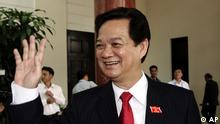越南法庭判处13名异议人士多年徒刑。
A little over a decade ago, Vietnam had a booming economy. An economic
crisis and mismanagement on all levels have driven the country to the
brink of ruin. It's up to the government to save what's left.
Tuan is a young, educated and ambitious Vietnamese from the city of
Hanoi. The country's economic golden days of recent allowed him to set
aside a small fortune - at least enough for a house for his family. He
had even considered buying a car. As an official working for the
regional government, he had a decent income. In addition, he invested in
real estate and in a television engineering company.
But his optimism has recently become overshadowed by fear and uncertainty. He has now given up the thought of purchasing an automobile. He is worried he will lose his savings and that the real estate market will collapse.
"I don't know how things will turn out. The national debt is weighing heavy on our country's shoulders. In the end, we all have to bear the brunt."
Real estate prices have fallen by 30 percent. Inflation continues to grow; in October 2012, the inflation rate was seven percent. The Vietnamese stock exchange index HNX is at the lowest point it a year. Ratings agencies such as Moody's and Standard & Poor's have downgraded Vietnamese bonds as "highly speculative."
Dangerous downturn
 The country's economic growth has slowed down to between four and
five percent. That is not enough to create jobs for the rapidly growing
population and the rising number of people entering the job market.
The country's economic growth has slowed down to between four and
five percent. That is not enough to create jobs for the rapidly growing
population and the rising number of people entering the job market.
"The slowdown is significant for a regime which couples its legitimacy with economic growth," according to Adam Fforde of Victoria University in Melbourne, Australia.
Fforde estimates that around one million people have lost their jobs within the past two years - a development expected to have implications in a country lacking a social welfare system.
Government rescue?
"I really hope the government finds a solution to the economic troubles," Tuan said, showing cautious optimism.
Vietnam expert Fforde - along with many others - is skeptical about the government's capabilities to find a solution, as it was the government itself who was responsible for a large part of the country's economic trouble in the first place; the "Doi Moi" program, which was introduced in 1986 to politically and economically open up and reform the country, has proved to be not very sustainable.
 Nguyen Tan Dung has admitted to making "economic mistakes"
"In 2007, the balance just fell apart," according to Fforde. "In the
end, the sad truth came to the fore: the government might not have as
much control as it appears and that everything up until now might have
just been good luck."
Nguyen Tan Dung has admitted to making "economic mistakes"
"In 2007, the balance just fell apart," according to Fforde. "In the
end, the sad truth came to the fore: the government might not have as
much control as it appears and that everything up until now might have
just been good luck."
Crisis management criticized
Vietnam - with a strong emphasis on its export market - was hit hard by the international economic crisis of 2007. Decision makers in Hanoi introduced expensive stimulus packages. But a large portion of that money got lost in corruption and mismanagement. All that's left is a huge deficit. Credit institutes are now stuck with up to 15 percent of toxic debt.
Party leadership has closed ranks after months of internal power struggles - a symbol that government has "understood just how serious the situation is," Vietnam expert Jörg Wischermann told DW. For the party leaders, it was first and foremost about securing their own power, then, about dealing with the country's issues.
Fforde sees the solution to Vietnam's current crisis in the development of a middle class. For that, investment would be necessary in the education and health sectors as well as in infrastructure. Reforms in the agrarian sector, which have not been updated since 1986, were also of vital necessity.
But his optimism has recently become overshadowed by fear and uncertainty. He has now given up the thought of purchasing an automobile. He is worried he will lose his savings and that the real estate market will collapse.
"I don't know how things will turn out. The national debt is weighing heavy on our country's shoulders. In the end, we all have to bear the brunt."
Real estate prices have fallen by 30 percent. Inflation continues to grow; in October 2012, the inflation rate was seven percent. The Vietnamese stock exchange index HNX is at the lowest point it a year. Ratings agencies such as Moody's and Standard & Poor's have downgraded Vietnamese bonds as "highly speculative."
Dangerous downturn

"The slowdown is significant for a regime which couples its legitimacy with economic growth," according to Adam Fforde of Victoria University in Melbourne, Australia.
Fforde estimates that around one million people have lost their jobs within the past two years - a development expected to have implications in a country lacking a social welfare system.
Government rescue?
"I really hope the government finds a solution to the economic troubles," Tuan said, showing cautious optimism.
Vietnam expert Fforde - along with many others - is skeptical about the government's capabilities to find a solution, as it was the government itself who was responsible for a large part of the country's economic trouble in the first place; the "Doi Moi" program, which was introduced in 1986 to politically and economically open up and reform the country, has proved to be not very sustainable.
 Nguyen Tan Dung has admitted to making "economic mistakes"
Nguyen Tan Dung has admitted to making "economic mistakes"
Crisis management criticized
Vietnam - with a strong emphasis on its export market - was hit hard by the international economic crisis of 2007. Decision makers in Hanoi introduced expensive stimulus packages. But a large portion of that money got lost in corruption and mismanagement. All that's left is a huge deficit. Credit institutes are now stuck with up to 15 percent of toxic debt.
Party leadership has closed ranks after months of internal power struggles - a symbol that government has "understood just how serious the situation is," Vietnam expert Jörg Wischermann told DW. For the party leaders, it was first and foremost about securing their own power, then, about dealing with the country's issues.
Fforde sees the solution to Vietnam's current crisis in the development of a middle class. For that, investment would be necessary in the education and health sectors as well as in infrastructure. Reforms in the agrarian sector, which have not been updated since 1986, were also of vital necessity.
沒有留言:
張貼留言